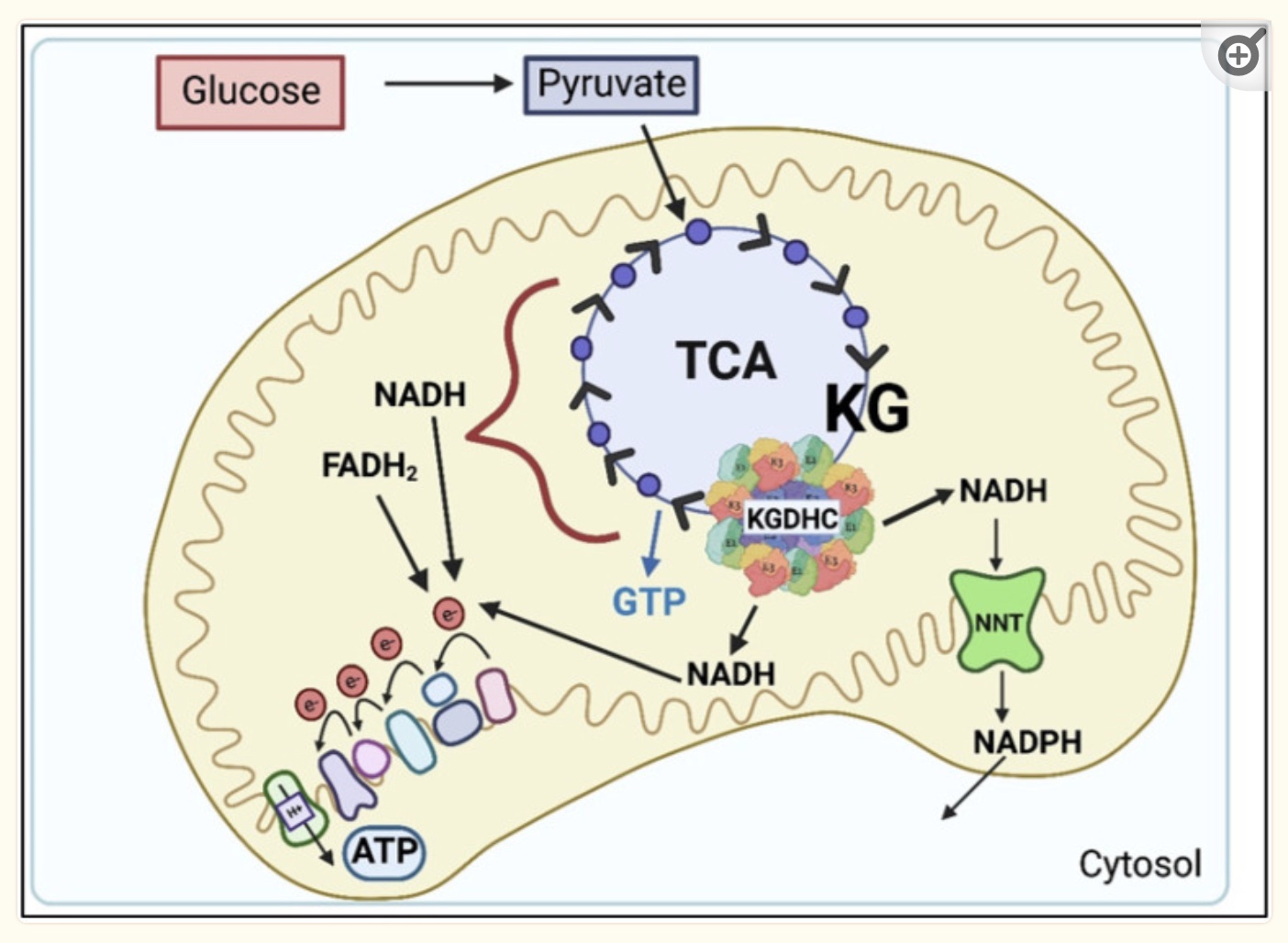Key takeaways:
~ Alpha-ketoglutarate (αKG) plays an important role in energy production, epigenetic regulation, stem cell proliferation, and inflammation regulation.
~Energy, inflammation, and cell renewal are essential for avoiding age-related diseases.
~ Levels of alpha ketogluterate decline in aging.
~ Supplemental alpha-ketoglutarate studies show intriguing results for improving healthspan.
What is alpha-ketoglutarate (AKG)?
Alpha-ketoglutarate (AKG) is a molecule produced by cells. It has several key roles in the body, including:[ref]
- It is involved in the Krebs cycle for energy production in the mitochondria
- αKG is important in epigenetic regulation of the production of other molecules in the cells
- It is involved in stem cell proliferation and the formation of bone cells
- αKG is important in regulating inflammation
These factors are essential for avoiding age-related diseases.
Notably, αKG (alpha-ketoglutarate) levels are decreased in aging. In fact, there is a 10-fold decrease in αKG between ages 40 and 80.[ref]
ΑKG in Energy Production via the Krebs Cycle:
The Krebs cycle is part of the process that creates cellular energy in the mitochondria.
Quick background: Mitochondria are organelles within cells that produce ATP from either sugar or fats. Depending on the cell’s energy needs, there can be hundreds to thousands of mitochondria. ATP (adenosine triphosphate) is the molecule that stores energy. Its bonds can be easily broken to release energy when and where it is needed in cells. Without ATP, there is no energy and, thus, no life.
Important to note is that the alpha-ketoglutarate produced in the Krebs cycle can be used for ATP production, or it can cross out of the mitochondria and be used for other purposes. Additionally, cells can use alpha-ketoglutarate to create glutamine, which can then be used as a neurotransmitter.[ref]
 Image from: https://www.ncbi.nlm.nih.gov/pmc/articles/PMC9603878/
Image from: https://www.ncbi.nlm.nih.gov/pmc/articles/PMC9603878/
When alpha-ketoglutarate is limited, there is a tradeoff between using it for energy production and other cellular purposes.
Epigenetics: alpha-ketoglutarate and DNA methylation
Centenarians, people living to 100+, have differences in their DNA methylation. Essentially, methylation is one way that cells can turn off or on different processes.
To reduce oxidative damage, the processes that need to be kept active in aging are sirtuins, DNA repair enzymes, insulin signaling pathways, FOXO genes, telomere extension, and cellular antioxidants.
Alpha-ketoglutarate (αKG) levels influence the transcription of FOXO genes. This is the same pathway that calorie restriction affects to extend lifespan. Additionally, αKG is a cofactor for DNA and histone demethylation enzymes.[ref]
Studies on alpha-ketoglutarate
OK, so αKG is vital for cellular energy production – and – it is necessary for DNA methylation regulation. Additionally, αKG decreases a bunch as we age.
What happens if we correct the decrease in αKG that naturally occurs with aging?
For around a decade, supplementing alpha-ketoglutarate has been known to increase lifespan in animals, such as mice and worms. Researchers using C. elegans (a worm used in research) found that increasing αKG extended the animal’s lifespan.[ref]
A recent study in mice revealed that alpha-ketoglutarate extended lifespan by approximately 10%. Even more importantly, it significantly improved healthspan.[ref]
Healthspan is the years that you remain healthy in aging. The last few years of life are often plagued with frailty, dementia, and severe chronic disease — healthspan is the time during aging when someone remains healthy.
The trial showed that the mice had less time when they were frail or had diseases of aging at the end of life.
How does alpha-ketoglutarate increase healthspan?
Supplementing with αKG, starting at mid-life and beyond, may increase energy production in the mitochondria and positively impact DNA methylation.
- Animal research shows αKG supplementation prevented the increase in cytokine levels that are normally associated with aging in female mice.[ref]
- αKG reduces the senescent cell inflammatory signaling, which is the problem with cellular senescence in aging.
- Supplemental αKG induces the browning of fat in mice.
- A positive effect on macrophages and shifting towards an anti-inflammatory type was noted with αKG.
- Giving female animals αKG during their reproductive years preserves ovarian function.
Here is some of the research detailing the AKG benefits for aging:
Suppressing inflammation:
One of the causes of aging is an increase in chronic inflammation. Research on αKG in mice showed that female T-cells produce higher IL-10 (an anti-inflammatory molecule) with supplementation. The researchers theorize this could be a primary factor in reducing animal frailty.[ref]
Reducing senescent phenotypes:
αKG may not eliminate senescent cells, but it reduces inflammation, a common side effect of cellular senescence.[ref]
Brown fat:
One reason for increased inflammation in aging is alterations to adipocytes (fat tissue). With age, fat cell turnover decreases, and existing fat cells become less functional and release inflammatory cytokines.[ref]
A benefit of αKG is that it can turn white fat into beige or brown fat. Brown fat is beneficial, as it has a large number of mitochondria, which give it a brown color under a microscope. These mitochondria produce heat, helping to burn off excess fat.
Mouse studies show that increasing αKG through supplementation increases the “beige-ing” or browning of fat.[ref] In aging, DNA methylation is involved in the reduction of brown fat. Thus αKG may be impacting fat storage, energy production, and inflammation via the positive methylation changes.
Macrophages and inflammation:
Macrophages are a type of cell that is part of the immune system. They can be either pro-inflammatory (M1) or anti-inflammatory (M2). Higher levels of inflammatory cytokines, such as TNF-alpha or interferon-gamma, cause macrophages to become M1 (inflammatory). On the other hand, higher levels of alpha-ketoglutarate promote the M2 anti-inflammatory type of macrophage.[ref]
Reproductive years extended:
Animal research indicates that αKG extends the animals’ fertility period. This is due to αKG’s ability to prevent telomeres from shortening in the ovaries.[ref]
Why would this be important in aging? For women, many of the deleterious effects of aging occur with the decrease in estrogen after menopause. Extending reproductive years, therefore, extends the period of higher estrogen production.
Osteoporosis and alpha-ketoglutarate:
αKG promotes bone development in animal studies and in a study of postmenopausal women. One way that αKG impacts bone strength is by producing needed proteins for the type of collagen found in bones. Another way is via regulating histone methylation of genes involved in bone formation.[ref]
In dental implants, regenerating the bone is important before the implant is placed. A study (in mice) showed that alpha-ketogluterate helped to promote the bone regrowth for dental implants in mice with osteoporosis. [ref]
Human clinical trials on alpha-ketoglutarate supplements
The rest of this article is for Genetic Lifehacks members only. Consider joining today to see the rest of this article.
Related Articles and Topics:
Inflammation: Causes and Natural Solutions
Take a deep dive into the causes of chronic inflammation and learn how to target specific inflammatory pathways to reverse or prevent chronic disease.
Your Genes and Coronary Artery Disease
Coronary artery disease (CAD) is heritable. Understanding your genes and a ‘heart healthy’ lifestyle can prevent heart attacks and death.
Creatine: Boosting Muscles and Increasing Brain Power
Creatine is an amino acid used in muscle tissue and the brain for energy in times of stress. Genes play a role in creatine synthesis. Find out what the research shows about creatine supplements for muscle mass and cognitive function.
Boosting NAD+ to Reverse Aging? Overview of NR and NMN
Explore the research about how nicotinamide riboside (NR) and NMN are being used to reverse aging. Learn about how your genes naturally affect your NAD+ levels and how this interacts with the aging process.

